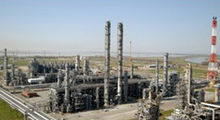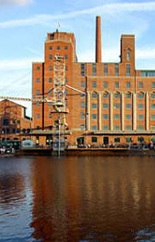Ethylene pipeline ARG
The ARGmbH & Co. KG - formerly ethylene pipeline company - operates an ethylene pipeline in Germany, Belgium and the Netherlands. It connects the petrochemicals located in Rotterdam and Antwerp with the petrochemicals in central Belgium, in South Holland as well as the Cologne area and the Ruhr area . From Cologne, the petrochemicals in southwest Germany (Frankfurt / Ludwigshafen) and in Bavaria (Ingolstadt / Burghausen) are also integrated via the ethylene pipeline south . The ARG pipeline is almost 500 km long and transports around 1.7 to 2.0 million t of ethylene between ethylene producers and ethylene consumers every year . After the company was founded on November 14, 1968 and completed in 1974, the pipeline is used by around 20 directly affiliated petrochemical companies with sales of around EUR 35 million.
Product information
Ethylene (C 2 H 4 ) is a colorless, slightly sweet gas that is neither toxic nor hazardous to water. Ethylene is produced in refineries by thermal cracking, in particular of the petroleum product raw gasoline ( naphtha ). It is the basis for the production of a wide variety of plastics such as B. polyethylene (PE), polystyrene (PS) and polyvinyl chloride (PVC). Plastic bags, beverage bottles, packaging material, foils, vehicle parts, floor coverings, insulating materials, detergents and cleaning agents are made from ethylene - via processing into polymers.
Infrastructure
The pipeline transports ethylene for around 20 people connected according to the " open access " and common carrier principle (general modes of transport). This means that the ARG pipeline is accessible to all ethylene producers and consumers at the same transport conditions. Those connected are feeders and consumers. With the petrochemical plants of BASF , Dow Chemical , ExxonMobil , LyondellBasell , SABIC , Shell and INEOS , seven of the ten largest chemical companies in the world with a production (cracker) capacity of approx. 10 million t are directly connected to the ARG pipeline system. Due to the construction of a subsidiary pipeline system and the transfer of the capacity of a third-party pipeline, the Rotterdam market is also directly connected to the ARG system.
Shareholder
- 20% BASF SE
- 20% INEOS Manufacturing Deutschland GmbH
- 20% SABIC Petrochemicals BV
- 20% SASOL Solvents Germany GmbH
- 20% Westgas GmbH
Ethylene pipeline ARG
Technical specifications
- Pipeline length: 496 km
- Diameter: 10 inches (DN 250)
- Insulation: bitumen / polyethylene
- Operating temperature: 5 ° C to 40 ° C
- Maximum operating pressure: 100 bar
- Transport capacity: approx. 2.5 million t / a
- Faucet stations: approx. 85
technology
The pipeline, with an 80 km long, double-laid section in Belgium, has a diameter of 25 cm (in Belgium partially 30 cm). The pipeline has approx. 85 electronically lockable valves for safety. The wall thickness is at least 8.8 mm with a safety factor above the standard. The pipe usually has an overlap of 1 m. The safety-related and operational data is transmitted via two redundant "communication paths". A control room (operations center) manned by at least two specialists 24 hours a day monitors the entire management system. The route is walked at recurring intervals and flown over at least every 14 days with helicopters.
safety
The security of the system during the operation of the pipeline system of the ARG is guaranteed by a large number of measures that at least meet the requirements of the respective national regulations. In many areas, such as B. during route control, the ARG monitors the pipeline system at shorter intervals than those specified by the ordinances. All monitoring and testing activities are checked at regular intervals by experts from the TÜV organizations. Technical support is provided by Evonik Pipeline Operations in Germany and Petrochemical Pipeline Services B.V. in the Netherlands and Belgium. The service providers are certified according to DIN EN 9001 and 14001.
Regulations, technical rules, personal commitments
In Germany, the pipeline system is subject to the Ordinance on Pipeline Systems (RohrFltgV) and the Technical Rules for Pipeline Systems (TRFL). In the Netherlands the rules of the BEVB decision (Besluit external veiligheid Buisleidingen) and the NEN 3650 apply and in Belgium the “Basic Law” (Basiswet April 12, 1965) and the royal decree for pipelines.
Taking these ordinances and the technical rules into account, the ARG has formulated a set of rules for all users of the transmission system - the General Conditions for Transit (ADB). They provide a uniform standard with regard to product quality, measuring systems, safety connections, etc. Every member and user of the system undertakes to comply with the ADB. In addition to the technical specifications, the key points of the transport contract are regulated in the ADB. These key points include the feed quality, pressure and temperature handling, transport execution and billing as well as liability issues.
history
- 1968 Foundation of Aethylen-Rohrleitungs-Gesellschaft mbH & Co. KG on November 14th
- 1970 Commissioning of the 1st section (Gelsenkirchen-Dormagen)
- 1978 Commissioning of the last section
- 1985 Throughput volume for the first time> 1,000,000 t p. a.
- 1991 Commissioning of the so-called "2nd line" in Belgium ( Antwerp to Kempen approx. 80 km)
- 2002 Foundation of ARG NL
- 2003 Foundation of RC2, 50/50 pipeline company of ARG NL and Port of Rotterdam, start of transports from Antwerp to Rotterdam
- 2007 Throughput volume for the first time> 2,000,000 t p. a.
- 2009 Commissioning of the PRG Propylenpipeline Ruhr GmbH & Co. KG, a petrochemical pipeline that is additionally supported and managed by ARG
Individual evidence
- ↑ Ordinance on pipeline systems
- ↑ General conditions of transmission of the ARG . Retrieved May 17, 2013.




